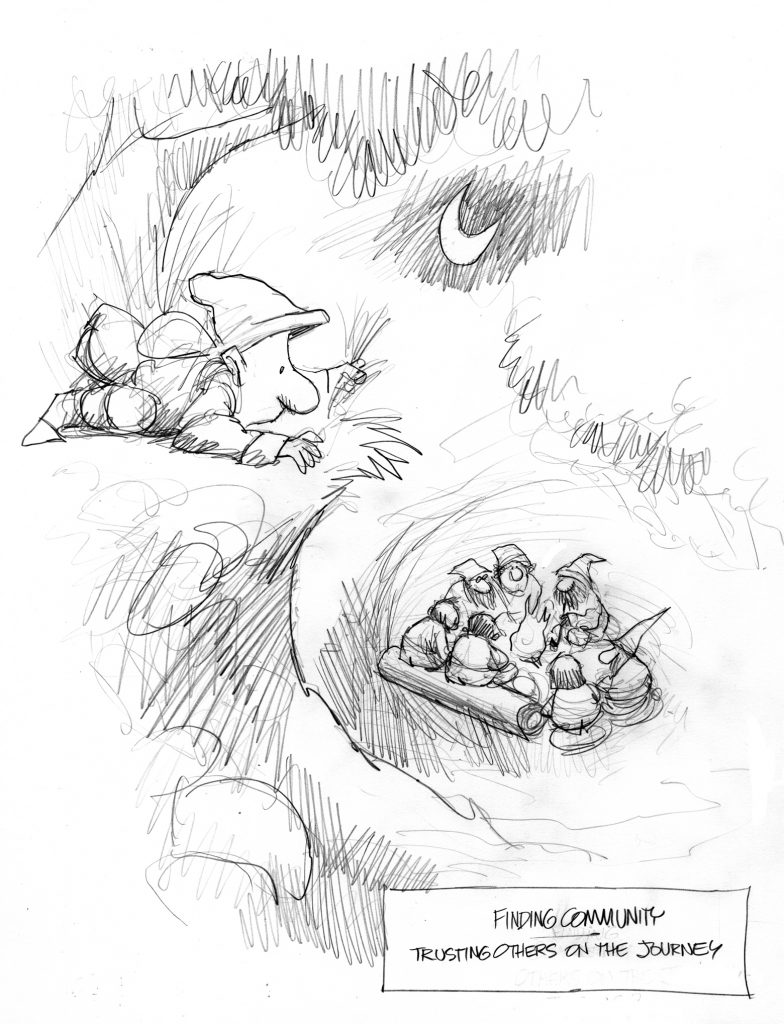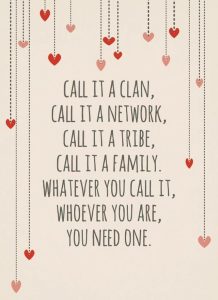Find Support
Find the Support You Need – Heroes Don’t Go Alone
You may have noticed that I talk a lot about networks that need to be built for connection and support. This is certainly the case for building competencies. You have resources that can support you in your journeys. Some of those resources are people – individuals, groups and organizations. Some resources are informational. Some will be obvious and some will not be./Family
Don’t Wait for the Resources to Come to You
The key, as the author of your life, is to use those resources. Waiting for the resources to come to you is a mistake. Waiting for others to somehow be the author for you doesn’t work. That was childhood, which is what needs to be left behind.
Guiding Questions – Building a Support Network
There are several questions that can lead to identifying which individuals, groups and organizations you can build into your network to support you in building the competencies you need.
Question #1
Who Can I Connect With?
Sometimes you just need help or support in developing competencies. That can range from people helping to find the opportunities or providing materials or transport to simply encouraging you or helping to develop skills or gain knowledge.
There are a surprising number of potential supporters out there. The key is engaging a bunch of people in small ways and not relying on just a few. That way no one will feel too much pressure and you will have lots of support from different perspectives. These people can support you in achieving the goals in your plan as well as developing specific capabilities that you are pursuing.
Companions
Companions can be extremely powerful. As teenagers, you are all in this journey together and all facing the same core challenges. Teenagers working together is one of the most powerful forces in the world, but it doesn’t happen often enough. You can talk with your peers about this challenge, about the competencies you are interested in developing, about how to go about that and about how to support each other. That’s powerful.
Teachers/Coaches/Mentors/Advisors/Family/Neighbors
There are more people that can play these roles for you than you would suspect – or that are obvious.
Most adults would be more than happy to support you, but not many will be very assertive in doing so. Partly that is because they don’t want to intrude on your life and a big barrier is that they don’t know how to support you – what would be helpful and welcome.
There are adults in clear roles, like teachers, parents, coaches, counselors and bosses. There are adults with specific competencies from whom you can learn, such as electricians, executives, shop keepers and chefs. There are also adults, like neighbors, extended family members, family friends, or parents of your friends, with interesting life histories from whom you can learn if you ask them about their lives.
Helpers, Healers & Supporters
So, we are back to being the author of the experience. You can lay out for adults you select what the competencies are that you want to develop and (a) let them know how you think they can help you or (b) ask them how they think they can help you. Some will probably disappoint you, but most will respond well.
Most adults are there for you – willing to help in large and small ways. So, help them help you.

Question #2
What can I Learn from These Supporters & How Do I “Help Them to Help Me?”
There Are Surprising Possibilities
Most people are happy to share their abilities with someone who is genuinely interested – if they are asked. It’s surprising how many opportunities to develop competencies there are when you think about the people in your life. But, you may need to do some work to engage them.
Coach People About How to Support You
You are asking people to support you, not because you are weak or inadequate or “needy.” You are putting together a network to help you achieve goals so that you can meet the challenges of becoming a successful young woman or man. Someone who can contribute. You matter and are of significance, so you are worth supporting.
This can be as simple as saying, “I am pursuing these goals and, if you are willing, I would like you to support me by __________________ (fill in the blank).”
That may seem awkward, but in most cases, you will probably be very surprised at how willing people are to support you – they will like doing it.
For most adults, teenagers are a mystery and they aren’t sure how to be supportive. If you tell them how to support you, you will actually be doing them a favor.

Question #3
How Can I Learn with Peers (& Others)?
This is surprisingly important. Learning with others is a powerful way to learn. Even if you are learning a skill with one other person, it increases your chances of success. It makes it more likely that you will stick with it. You can challenge and support each other along the way. You can learn from each other.
As with adult supporters, you can also “contract” with peers to go forth together – challenging and supporting each other on the journey. “Let’s go forth together and challenge and support each other in ________ (fill in the blank).”
Simple Ways to Support Each Other
- Encourage each other
- Celebrate each other’s successes – particularly small successes along the way
- Challenge each other to “hold the course” and not give up or drop out or slow down
- Pick each other up when you hit the inevitable barriers or setbacks or get frustrated or discouraged
- Challenge each other to do the homework or practice necessary
- Remind each other why you are committed to build competencies (we are significant, we need them to be successful young adults, it feels good to build a competency, etc.)
- Help each other by coaching where one is ahead on a topic
- Share resources

It takes courage to engage people in supporting you and then relying on them – but heroes don’t go alone. They never do in the myths and stories and they don’t in real life either.
